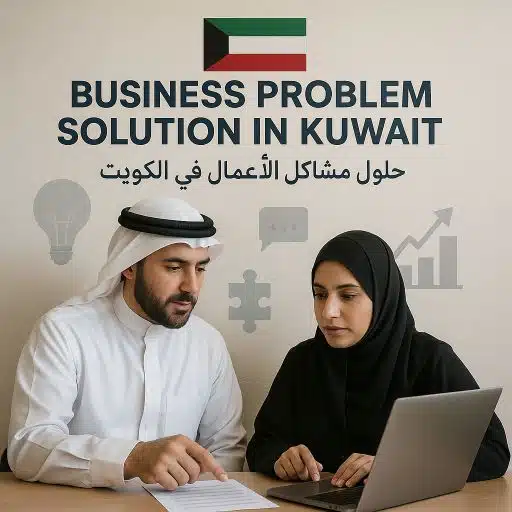I want to start with a little story (yes, you’re invited to sit back and read like this is a coffee chat). A few years ago I found myself in a small café in Kuwait City, trying to sketch out a business plan. How to Solve Business Problems in Kuwait
I’d been buzzing with ambition, fueled by café-lattes and the idea that this was my year. But I also felt that creeping slog of uncertainty—how do I align what I want to do with my beliefs? How do I run a business here in Kuwait and make sure it’s not just about profit, but purpose too?
Turns out, the question isn’t just theoretical. If you’re doing business in Kuwait, you’re going to bump into a few common problems: regulations, cultural expectations, ethical trade-offs, financing that feels off. And if you care about doing things in an Islamic way—well, the path gets both more meaningful and more complex. So this piece is for you: you, who want to build something in Kuwait, who don’t want to compromise, and who want to use Islamic principles as a guide, not a constraint.
What’s Going On in Business in Kuwait?
Let’s talk about what the terrain looks like before we get into solutions.
In Kuwait, doing business comes with both opportunity and friction. The regulatory environment is unique, market dynamics are shifting, and cultural-business norms matter a lot. anzlaw.thomsonreuters.com+2thelawyersglobal.org+2
On top of that, when you add Islamic business ethics into the mix—values like trust, fairness, avoiding exploitative interest (riba), working with integrity—the game changes. There’s real research showing that managers in Kuwait rate the “Islamic work ethic” quite high. ResearchGate
And yes, there are specific problems in Islamic-compliant businesses: financing structures, communication, client expectations. journals.ajsrp.com
So if you’re thinking: “Hey, I want to build a business that makes money and follows my values,” you’re not alone. But it means identifying the pain-points and applying solutions that sit well with both business logic and Islamic ethics.

Pain-Points You’ll Likely Face (and Why They Matter)
Let’s get real. Here are a few of the common hurdles—so that you can spot them early in your story.
1. Financing that feels off
Maybe you’re offered a loan or a structure that uses interest, or you’re unsure whether this partnership violates Sharia principles. It’s not just about legality, it’s about inner peace.
Research shows Islamic banks in Kuwait struggle with certain risk management and product design issues. Journal of Islamic Banking and Finance+1
2. Alignment of business with values
You might find yourself doing something because “that’s how it’s done” in your industry—but something about it doesn’t sit right. Maybe a contract clause, maybe how employees are treated. If you’re striving for something ethical, this friction shows up.
3. Cultural/market expectations vs. value-led business
Kuwait’s market has its own rhythms—what works culturally, what decision-makers expect, the personal networks (yes, the “dewaniya” style meetings matter). Wikipedia+1 If your business model is value-driven but you ignore the context, you’ll feel the drag.
4. Communication and transparency issues
Especially with Sharia-compliant ventures, clarity matters. What’s the profit share, who takes the risk, how is governance structured? A study found Islamic bank clients in Kuwait perceived issues around managerial, financial and communication problems. journals.ajsrp.com
How Islamic Principles Can Be Your Solution (Yes, You Really Can Use Them)
This is the heart of the post: practical ways the values you care about can guide business decisions and lead to real-world, Kuwait-appropriate solutions.
A. Make your business model ethically anchored
Start by asking: What are the core Islamic values I want to embed? Honesty, fairness, avoiding exploitative interest, sharing risk. Then: How can my model reflect that?
For example: Instead of defaulting to interest-based financing, look into profit-sharing (mudarabah), leasing (ijarah) or partnerships (musharakah) where risk and reward are shared.
(The research shows Kuwait’s Islamic financial sector is still working these features actively.) MDPI+1

B. Let transparency be non-negotiable
When you’re doing business, folks are going to trust you (or not) based on how clearly you lay things out: what’s expected, who takes what risk, when do they get paid.
This means: clear contracts, documented agreements, shared governance.
Since culture in Kuwait highly respects relationships and trust, this builds social capital as well as business capital.
C. Respect the cultural-business rhythm of Kuwait
You’re not in a vacuum. You’re in Kuwait. So: network, show up, understand how decisions get made. The “dewaniya” spaces (informal gatherings) are more than coffee—they’re part of how business gets done. Wikipedia
Use this: attend, ask questions, listen. But bring your values in—don’t lose them.
D. Lead by example—work ethic matters
The study of Islamic work ethic in Kuwait found a strong link between ethical work behaviour and loyalty among managers. ResearchGate
In plain terms: When you show you’re doing right by your employees, clients, partners, it matters. It’s not just “nice”—it pays off.
E. Adopt flexible but faithful frameworks
You don’t have to reinvent the wheel. Use existing frameworks in Islamic finance and business, adapt them to your setting. Whether in financing, contracts, or governance, look for what’s already out there and tailor it.
For example: Ensure your compliance-checks are rooted in Sharia principles; check how Islamic banks in Kuwait deal with risk and take their learnings. Journal of Islamic Banking and Finance
A Step-by-Step Action Plan You Can Start With (Yes, right now)
Let’s make it real:
- Write down your “why.” Why are you in business? What value do you want to offer? How do you want to behave?
- List the major challenges you expect (financing, market fit, contracts, culture) — pick 2-3 you want to tackle first.
- Choose one Islamic-principle focus for your business this quarter (e.g., profit-sharing instead of interest, or fair wage practices).
- Map out your business context in Kuwait — who are your stakeholders, how do decisions happen, what cultural rhythms matter (networks, gatherings, family ties).
- Draft a simple agreement or framework for your first major partner/client: putting transparency and shared-risk terms in writing.
- Check in after 3 months. What worked? What didn’t? How did aligning with Islamic principles help (or feel harder than expected)?
- Share your story. Whether on your website, in your meetings, to your team—telling people you’re doing business this way builds trust.
What If Things Go Off-Track?
Because they will. You’re human. The market will pull you one way, your values another.
- Pause and ask: “Is this move aligned with my values?”
- Get an accountability partner: a mentor, friend, imam, colleague who understands both business and Islamic ethics.
- Revisit your why. Remind yourself why you chose this path.
- Adapt but don’t surrender. You might find you need to pivot—but the principle stays the same.
Wrap-Up: Why This Matters (For You)
What I’m trying to say—and what I hope you feel—is: you don’t have to choose between profit and purpose. You don’t have to go “full secular business” or “full mosque”. You can build something in Kuwait that is rooted, relevant, respectful—of both the market and your values.

When I put my boots on and walked through that café in Kuwait City, I felt the tension: “Do I fit in? Do I compromise? Or can I do it my way?” I chose the latter. It wasn’t easier. But it felt better. And you can do the same.
If you keep asking the right questions, stay honest, stay connected to both your values and your market—you’ll give yourself an edge. And one day, someone will look at your business and say, “They did it differently—and it worked.”
FAQ about How to Solve Business Problems in Kuwait
Q1: Can I really run an Islamic-compliant business in Kuwait and still compete?
Yes. The key is aligning your model with both the market needs and your values—it’s not one or the other.
Q2: How do I find Sharia-compliant financing in Kuwait?
Look into Islamic banks and financial institutions in Kuwait. They have frameworks tailor-made for shared-risk models. But always read the documents and ask how it aligns with your values.
Q3: What if the cultural expectations in Kuwait conflict with my values?
You won’t be the first or the only one facing this. Approach respectfully, seek to understand, and hold firm to your non-negotiables.
Q4: How do I build trust when I choose ethical business practices?
Transparency is your ally. Communicate your values, your processes, your risk-sharing model. Trust grows when people see you act consistently.
Q5: Does Islamic business practice mean no profit?
Not at all. It means profit and justice. Profit can be made—just in a way that doesn’t exploit, cheat, or cut corners.
Q6: Where can I start if I feel lost?
Begin with your “why”. Get clear on your values. Then map one small step you can take. Then another. Momentum comes from doing, not just planning.
If you like, I can pull together five local examples of businesses in Kuwait that are using Islamic-principles successfully—and we can dissect how they did it (so you can borrow tactics). Do you want that?


